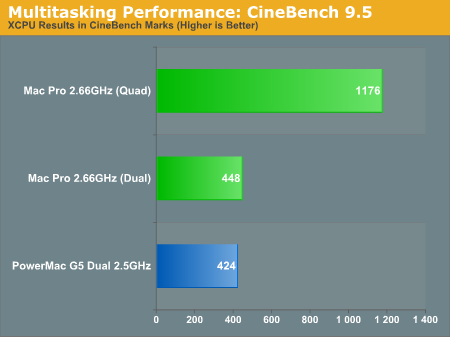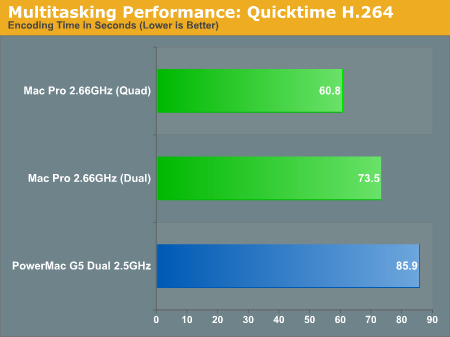Apple's Mac Pro - A True PowerMac Successor
by Anand Lal Shimpi on August 16, 2006 12:27 PM EST- Posted in
- Mac
Multitasking Performance - The Quad Core Advantage
We're almost at the end of the review and so far we've hardly shown any performance benefit thanks to quad cores; just about all of the benchmarks we've presented here today could be duplicated if you only had a single Xeon in the Mac Pro instead of two.
It seems that many multithreaded applications are specifically targeted at dual core systems, and scaling above and beyond two simultaneous (and CPU intensive) threads just isn't where it needs to be for four cores to make a big difference. With the trend in CPU architectures being to significantly ramp up the number of cores, software will follow, but for now truly taking advantage of four cores is much like the early days of dual core processors: you either need an application that is specifically designed to scale to four cores (e.g. CineBench/3D rendering), or you need to be a heavy multitasker.
We've already shown what the former can bring, but what about the latter? How much of a benefit do you gain from having four cores at your disposal? To find out we combined two of our benchmarks - the multithreaded CineBench 9.5 test and our Quicktime H.264 encoding test. We started the H.264 encode first and then started the CineBench rendering test; we reported scores for both.

With only two cores, the CineBench results between the PowerMac G5 2.5GHz and the Mac Pro 2.66GHz are reasonably close, with the Mac Pro only holding a < 6% advantage. The H.264 encoding performance is a bit more favorable to the Mac Pro, with the dual core 2.66GHz solution outperforming the G5 by 14%.

Enabling the remaining two cores on the Mac Pro however really changes the picture; the four core Mac Pro is 1.6x faster than the hypothetical two core version in CineBench and at the same time is 17% faster in the H.264 encoding test.
It's not too surprising to expect that the more CPU intensive tasks you run simultaneously, the more of a performance improvement you'll see with four cores vs. two. It's just like the early days of dual core CPUs; just wait until Apple throws two quad core Clovertowns in the Mac Pro, then we'll really start running out of things to do with them.










96 Comments
View All Comments
spike spiegal - Thursday, August 17, 2006 - link
Question 1:Apple users have been bad mouthing Intel and PC's for over a decade and touting the superiority of Motorola, and then IBM over Intel. Now that Apple is running on nothing more than PC clone with an Apple bios and beating the heck out of the dual G5, isn't this a little hypocritical? When Apple switches to Cyrix next year, how much faster will those machine be over Intel?
Question 2:
If OSX so much more "secure", "faster" and "easier" to use than Windows or Linux, and OSX is closer to Unix than Liux is, why have I never encountered an Apple machine or OSX inside a corporate server farm? Are the graphics artists in the company media dept using Macs that much more intelligent than the network engineers who's job is on the line to keep commerce up 24/7?
Question 3:
A year from now when E-machine is selling boxes that cost half the price of the new PowerMac and has twice the horsepower because of new processors being introduce by either AMD or Intel, how can we fudge PowerMac benchmarks for the courtesy of Apple users?
Question 4:
I want to run OSX legally on my dual core AMD, and I don't want to buy a new computer just to run OSX. I can run Windows on any hardware I want...why not OSX?
plinden - Thursday, August 17, 2006 - link
Q1: Hmm, have you heard about the best tool for the job? G5s kept up well with Intel and AMD, and were often faster - sometimes much faster - but weren't going anywhere in the foreseeable future. Did you notice that that the new 2.66GHz Xeons aren't much faster than the 2.5GHz G5s they're replacing? But the potential is there for the future (the 3GHz Xeons show that). I don't know whether you're an AMD or Intel fanboi, but would you continue using a CPU from your current favourite manufacturer if you could foresee {AMD/Intel - delete as necessary} pulling well ahead? A computer is just a tool to get things done, what CPU is in there is a pointless argument, and your strawman argument just makes that all the more obvious.Q2. Hmm, have you heard about the best tool for the job? XServes are gaining some traction, especially in specialist areas, but I work a company that delivers streaming content on the internet, and we use (mostly) generic PCs running RedHat ES. We also have a number of Windows Media Servers for encoding wmv content and use Apple's Darwin QuickTime Streaming Server (running on Linux, incidentally). The fact that I actually enjoy doing my work with OS X, and find myself being more productive with desktop applications, doesn't mean that if I were making the buying decisions for my company, I would immediately insist on using XServes just because they're from Apple.
Q3: Cool, e-Machines are going to be producing 8-CPU Xeon-powered workstations for $1250? I might get a couple of those for the kids. Or maybe Apple might upgrade their offerings ... they've been known to do that occasionally.
Q4: Because Apple owns the rights to OS X, they make the decisions. If they offered OS X to run on any PC, I would be first in line to install it on my Dell laptop.
michael2k - Thursday, August 17, 2006 - link
1) At the time those comments were made, PPC was faster than Intel, literally. Then the IBM was faster than a P4, just like an Opteron was faster than a P4. You would be stupid to believe if Cyric made a faster, cheaper, cooler CPU that Apple wouldn't consider it.2) Why would a corporate SERVER FARM care about "secure", "faster", or "easier"? A SERVER FARM cares about redundancy, reliability, recovery, and distributed computing. The only places you will find a Mac are places that care about:
1) usability, say at a design firm
2) design, say at a advertising firm
3) ease, say at a home
Also, you do know that the pural for "anecdote" is not "data", right? Your anecdote only means you have limited experience.
3) Easy, drop in a new Intel processor.
4) Because no copy of OS X exists for generic x86 hardware. You also cannot run Windows on any hardware you want. Try to run it on an SGI MIPS workstation, an IBM PowerPC Workstation, a Dec Alpha workstation, or an Apple G4 iMac. This is despite the fact that Microsoft originally wrote Windows NT to support Alpha, MIPS, PowerPC, and Intel. You want to know why Apple won't produce generic OSes? Because they aren't big enough to afford the support and market costs. Until, I think, they hit 30% marketshare, they can't afford to sell their OS as a generic software kit.
saratoga - Thursday, August 17, 2006 - link
PPC was very rarely faster then x86. More often it was on par, but seldom faster, and usually only briefly. People went on and on about PPC performance because they had bought expensive PPC systems.Dubb - Thursday, August 17, 2006 - link
Really curious about those three:1) any issues with xp-64
2) We all know you have clovertons already. put them in and see what happens. then tell us.
3)Apple's price on a 4500 is way overpriced. there has to be a way to get a quadro 3500 working in one.
mgrimard - Thursday, August 17, 2006 - link
Since it is cheaper than a Dell, what about using as a server (with Windows Server 2003)?It is a server that it will most benefit from the quad-core and dual-gbe, don't you think?
Calin - Thursday, August 17, 2006 - link
"Of course if there's performance to be lost, we're there to benchmark it."That is very funny :)
And by the way, very nice article. Enjoyed every page of it. Thanks!
IntelUser2000 - Wednesday, August 16, 2006 - link
FB-DIMMs are not at complete fault here. It lies majorly in the memory controller. PC chipsets ALWAYS perform better than the workstation/server ones.
Calin - Thursday, August 17, 2006 - link
I find it strange that dual and quad channel FBDIMMs have the same memory read speed in Everest (or the difference is so small as not to be noticeable)dborod - Wednesday, August 16, 2006 - link
I understand the advantages of installing 4 FB-DIMMs vs. 2 FB-DIMMs and the need to install them in pairs, but does it matter if the first two pairs of FB-DIMMs are of difference sizes? In other words is 2 x 512 MB and 2 x 1 GB FB-DIMMs going to result is lower memory performance than 4 x 512 MB FB-DIMMs?